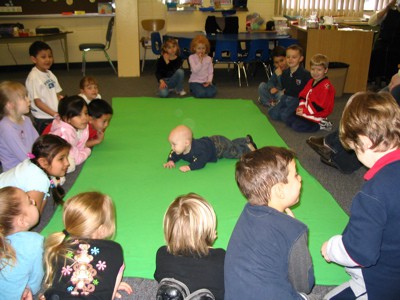I’m delighted to see that one of the great pioneers of empathy education, Mary Gordon, has just had her book Roots of Empathy: Changing the World Child By Child, published in the UK. It’s about time. The programme she founded in Canada in 1995, also called Roots of Empathy (ROE), has revolutionised how empathy skills are taught in the classroom. ROE has now reached over a quarter of a million Canadian school kids – including aboriginal children – and has spread to New Zealand, the United States and the Isle of Man. The originality of ROE is this: the teacher is a baby.
The idea of a ROE class is to nurture children’s ability to step into the shoes of others and respond in an appropriate way. What happens is that each class ‘adopts’ a baby, who visits them every few weeks over the course of the school year with the mother or father. Aided by an instructor from the programme, the pupils watch the baby’s unfolding development, discussing its emotional responses and changing view of the world, as well as the parent-child relationship. They also do a range of activities related to the baby visit such as drama and art work, which helps them shift from trying to understand the baby’s feelings and perspectives to trying to understand those of their classmates and the wider community.

So if you walk into a ROE class you might see something like this. A group of seven-year-olds are gathered around a gurgling baby boy lying on the floor. They are discussing why the baby seems so upset, trying to understand what he is thinking or feeling. Afterwards, they break into groups and explore their similarities or differences with one another about what makes them happy or upset. Before the baby leaves they may make him a gift to take home, and sing him a song.
ROE is a hugely successful example of a ‘social and emotional learning’ programme. It has reduced playground bullying, encouraged cooperative behaviour, improved pupils’ relationships with their parents and has also had a positive impact on academic performance.
Beyond this, what really impresses me is that Mary Gordon recognises that empathy development is a crucial element of social change. She sees it as a way of creating global citizens, and educating a new generation who will care about tackling the world’s social ills. ‘Empathy is integral to solving conflict in the family, schoolyard, boardroom and war room,’ she says in her book. ‘The ability to take the perspective of another person, to identify commonalities through our shared feelings, is the best peace pill we have.’
I recently wrote a report for Oxfam encouraging the UK government to introduce Roots of Empathy and other innovative forms of empathy education in the English school system. Though they have begun some empathy programmes such as Social and Emotional Aspects of Learning (SEAL), they still haven’t seen the wisdom of bringing babies into the classroom as teachers. Let’s just hope a few government ministers read Mary Gordon’s inspiring book.